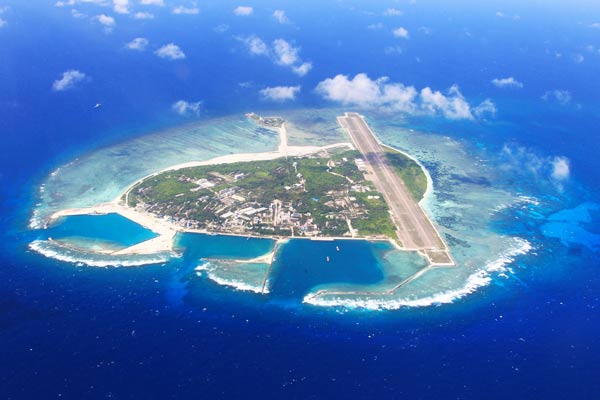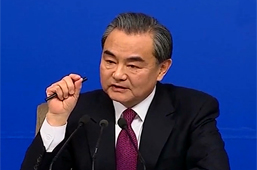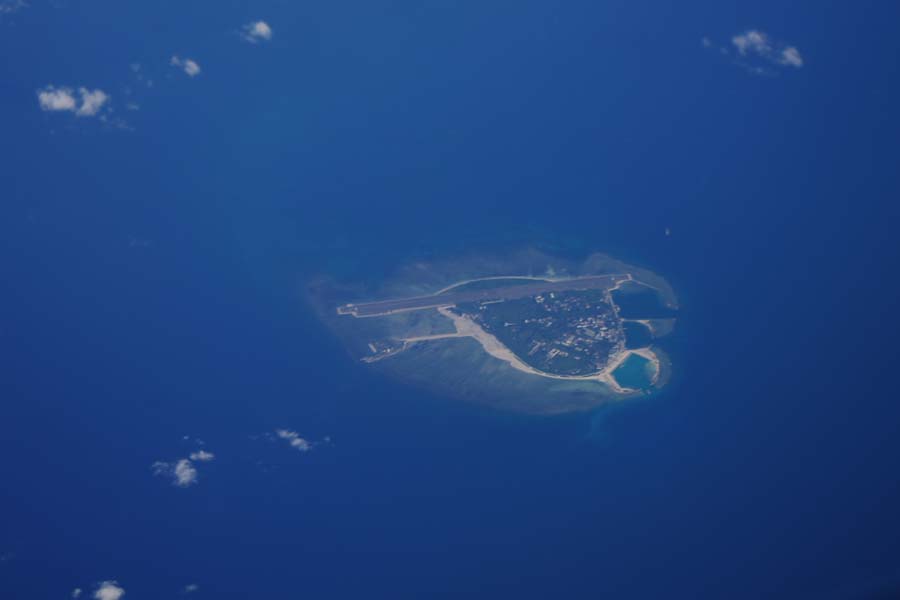
Yongxing Island is home to the government of Sansha, China's southernmost city. [Photo/Xinhua]
New think tank at Peking University offers perspective on resolving dispute
China will likely face more disputes when pushing for progress in negotiations and cooperation regarding the South China Sea, according to new situation report released on Tuesday.
The report suggests China should enhance maritime strategic dialogue with the United States, closely monitor subtle moves by some ASEAN countries and persuade extra-regional powers such as Japan, Australia and the United Kingdom to help ease tensions in the region.
The South China Sea Situation Report was published by the South China Sea Strategic Situation Probing Initiative, a think tank under Peking University's Institute of Ocean Research. The initiative was launched on Tuesday to provide data services and situation analysis about the region.
Hu Bo, director of the Center for Maritime Strategy Studies at Peking University, said the overall situation in the South China Sea has eased in recent years, and joint development and maritime cooperation have made solid progress in fields such as fisheries, petroleum, gas and defense.
"However, conflicts and barriers begin to surface as the negotiating sides move from consensus to discussing specific details, such as drawing a territorial boundary," said Hu, one of the authors of the report.
For example, fishery resources are very mobile, so how to build a multilateral fishery cooperation mechanism to regulate production and conservation in the region will be challenging, he said.
Oil and gas development can be even more sensitive because whichever country controls these resources will greatly bolster its economic presence in the region, Hu said. "Therefore, a preferable way is to steadily push for cooperation with bilateral participation."
Complicating matters, he said, the US has increased its military presence in the South China Sea in recent years under the so-called freedom of navigation operations. But Hu said he believes the focal issue of China-US contention is more about geopolitical competition than it is about sovereignty and freedom of navigation.
"The US is very anxious about China's growing naval capability and continues to wrongfully perceive it as a threat to US military dominance and a means to control the South China Sea," he said. "It is imperative that China and the US enhance the quality of maritime strategic dialogue on substantive issues, including arms control, power structures and rules for military operations."
Hu said China has exercised restraint in handling the South China Sea issue.
"China and the US should learn to coexist with each other in the South China Sea," he added.
Liu Lin, a researcher on foreign military at the People's Liberation Army Academy of Military Science, said some ASEAN countries are trying to protect their maritime interests via military buildup and resource development in the region, as well as by attracting foreign countries to play a part in the South China Sea situation.
"China will not change its fundamental relationship with ASEAN countries," she said. "But as the negotiation for the code of conduct continues, it will inevitably touch some sensitive and complex issues, and new conflicts might occur if these issues are not handled properly."
Tang Pei, associate researcher at the PLA Naval Research Academy, said a handful of foreign countries are increasingly interested in stirring up tensions in the South China Sea, and their methods are becoming more sophisticated.
"Many of these foreign powers are US allies, and their participation in the situation will shift the power dynamics in the region," she said. "To what extent they are willing to follow US actions to pressure China, despite having no conflicts of interest, is still unclear and will require further research."















